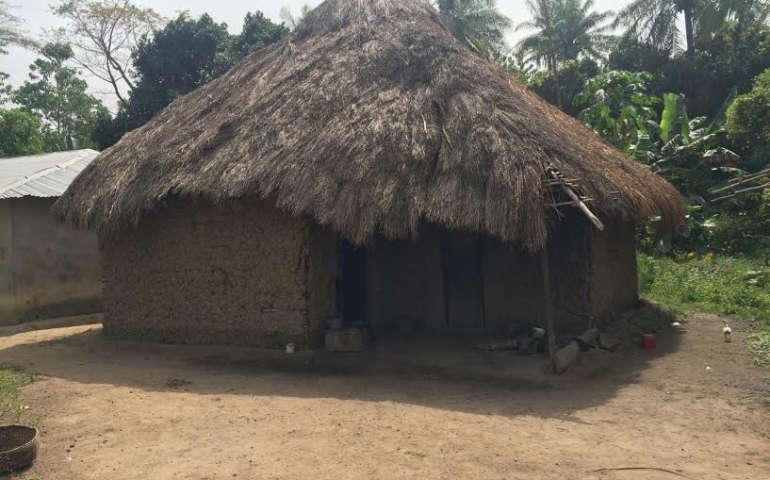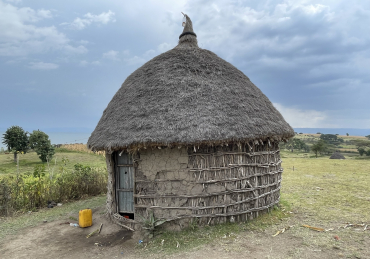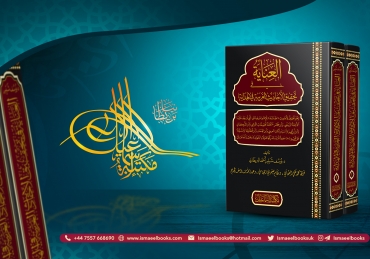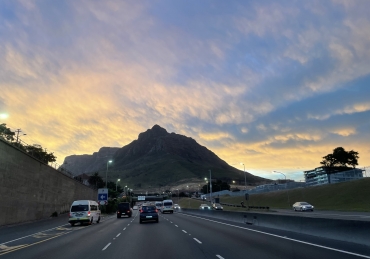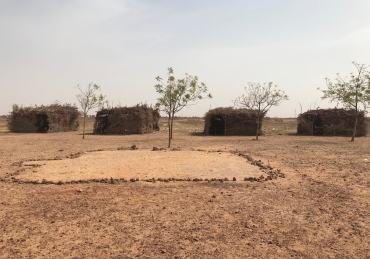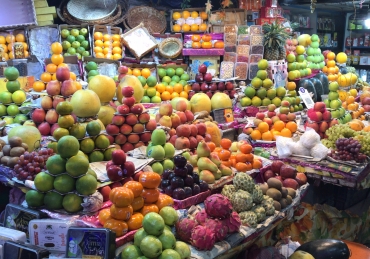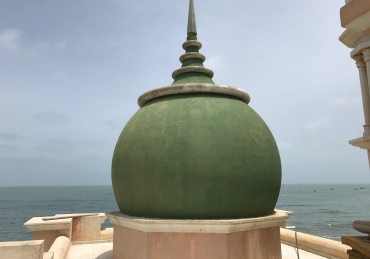Six Days in Sierra Leone
بسم الله الرحمن الرحيم
The following is a daily account of a visit to Sierra Leone by Shaykh Yusuf Shabbir and Shaykh Muhammad Ahmad of Ummah Welfare Trust in Rabīʿ al-Awwal 1438 / December 2016.
Day 1 – Sunday 25 December 2016
Returning to Sierra Leone
Sierra Leone is a country in West Africa that is bordered by Guinea on the north, Liberia in the south-east, and the Atlantic Ocean in the south-west. Six months ago, I visited Sierra Leone to participate in a national daʿwah tour and understand the challenges facing the local people. An account of our eight day visit is accessible on this link. The visit was an eye opener particularly in relation to the challenges facing the people and the limited support from Muslim nations and charities. After concluding the tour, we promised the community leaders that we would share our observations with charities in the UK and request them to support the nation.
On my return to the UK, Ummah Welfare Trust (UWT) expressed an interest in working in Sierra Leone and requested I accompany them to undertake an assessment for relief and development projects and deliver a Food Aid programme. Thus, Shaykh Muhammad Ahmad of UWT and I depart from London Heathrow on Saturday 24 December on the Air Moroc evening flight via Morocco and arrive into Freetown, Sierra Leone in the early hours of this morning. We are received by a diplomatic car and escorted to the terminal. The airport is not located on the mainland so we cross over the Atlantic Ocean via a twenty minute express speed boat.
Throughout the day, we have several introductory meetings including with the Sierra Leone Muslim Missionaries Union who share with us their history, mission, strategy, and funding constraints. Established thirty years ago, the Union is a consortium of scholars and preachers and appears to be one of the most effective Muslim organisations in the country. Its programmes include humanitarian projects as well as education and development projects. Its annual budget is $200,000. The union runs two schools and a Qurʾānic college, sponsors orphans and has built thirteen mosques during the past year. It is interesting to learn that the annual fee at the school run by the Union is £50 a month. Yet, many parents are unable to afford this nominal amount.
The Union has also been running a popular radio station, the Voice of Islam since 2006. It is the largest Muslim radio station in West Africa and has regional coverage. The radio broadcasts twice a day from 5am to 12pm and 5pm to 12am. Later in the evening, we are invited to participate in a radio panel discussion regarding the charities plans to work in the country. We interact with listeners and are overwhelmed with the warm welcome we are given on air. The Radio is a powerful tool for daʿwah and requires further support. This not least because in 2014 a fire damaged much of its equipment and infrastructure.
Based on our initial discussions during the day, we identify four challenges and possible programmes to address these challenges which will underpin our focus over the next few days:
(1) Religious challenge – Christians are working aggressively to convert poor Muslims through various schemes. According to a recent census, we are told, 66% of the population is Muslim. This in the recent past was 75% and prior to that 85%. The other significant challenge in this regard is from the Ahmadiyya (Qādiyānī) sect. The Ahmadiyya claim to have a significant present in the country with over 500 places of worship, schools and centres. The religious scholars here do not regard them as Muslims; as is the general consensus of Muslim scholars worldwide. However, some locals regard them as Muslims due to lack of knowledge and deceit. We learn that their leaders in their places of worship portray Mirzā Gulām Aḥmad Qādiyānī as a Caliph as opposed to a Prophet to broaden their appeal. Whilst the Ahmadiyya are not aggressive in their preaching, their subtle programme particularly through their network of schools has provided them a degree of political and social legitimacy which is of significant concern. To address these challenges, we discuss several potential programmes including Muslim schools, Makātib (supplementary Muslim schools), building mosques, training and empowering Imams and Islamic awareness programmes.
(2) Humanitarian challenge – the country is one of the poorest countries in the world and has faced the brunt of Ebola and other national disasters. We discuss our plans to distribute food aid over the next few days to 1,000 families. We also discuss other humanitarian initiatives and how they can address the aforementioned religious challenge.
(3) Economic challenge – the impact of poverty is exacerbated by the economic recession despite the fact that the country has huge potential in agriculture, minerals and other sectors. Merely providing food or short term aid is not the solution to break the cycle of poverty. Possible programmes, we discuss, include establishing community farms, distributing seeds and providing fishing boats.
(4) Social challenge – there are many social challenges particularly facing the youth. We learn that the divorce rate is 30% and many young couples are not undertaking marriage for a variety of reasons including financial inability to get married. We discuss the possibility of funding group weddings, a concept that has been hugely successful in India where £300 is sufficient to fund a marriage and provide some basic furniture and household items.
It has been a tiring long day. We rest just after midnight.
Yusuf Shabbir
Freetown, Sierra Leone
Day 2 – Monday 26 December 2016
Where are the Muslims?
We begin the day meeting with the Sierra Leone Muslim Congress, the oldest indigenous Muslim organisation in Sierra Leone that provides support and challenge to the government. The Congress was established in 1928 during the colonial period in response to the arrest of those who performed the Adhān. Ever since, the Congress has championed Muslim causes and established several projects. This has included lobbying the government for Eid holidays and establishing several schools. Although the Congress currently has limited projects due to funding constraints, it continues to operate relying on the voluntary services of its board members who are all respected professionals in their own fields.
Next, we meet with the Supreme Islamic Council which is the umbrella body for Muslim organisations in the country. This is followed by a fruitful meeting with the United Council of Imams. There are up to 50,000 Imams in the country and more than 10,000 mosques. Most of the Imams are not adequately trained. During the Ebola crisis, 250 Imams were killed. What is perhaps most shocking is that the Imams are not remunerated at all. It is for this reason my colleague Shaykh Muhammad Ahmad of UWT suggests that it is a priority of the charity to empower the Imams and provide them with the dignity and training, enabling them to serve the community and educate the local communities. We also have a discussion with the United Council of Imams regarding the Ahmadiyya (Qādiyānī) sect which they categorically do not regard as Muslims. We learn of their attempts to take over mosques by providing funding for renovation and their legitimisation strategy by establishing a network of two hundred schools.
Later in the afternoon, we visit the headquarters of Sierra Leone Muslim Missionary Union where we participate in a conference attended by several hundred people. Shaykh Muhammad and I are both requested to deliver keynote speeches. The complex comprises of a Qurʾān College, a clinic, a mosque and a school. The college benefits from several Egyptian Arabic teachers and Qurʾān experts who have studied at Azhar University and are currently working here. We meet a dedicated Egyptian doctor who works at the clinic and has sacrificed his wealth and life for the poor people.


A common concern shared by various organisations is the lack of private Muslim cemeteries and the lack of segregation in the public cemeteries. Apart from a few private tribal cemeteries, most Muslims are buried in mixed graveyards with no separation between Muslims and non Muslims. There is an urgent need to lobby the government to provide segregated arrangements as well as establish private Muslim cemeteries.
It is clear that the various Muslim organisations are trying their utmost best to make a difference despite their limited resources. However, a respected leader shared with us his tearful plea. He said: “The vast majority of the victims of the rebel war, Ebola, and the recent flooding are Muslims. However, the vast majority of aid is provided by the Christian agencies. Where are the Muslims?”
Yusuf Shabbir
Freetown, Sierra Leone
Day 3 – Tuesday 27 December 2016
Dead bodies transported in wheel barrows
It is an early start this morning as we head towards the second largest city in Sierra Leone. Bo, also commonly referred to as Bo Town, is the capital of the Southern Province. The region has a larger percentage of Muslims than Freetown and the Western Province. The distance between Freetown and Bo is 150 miles but the journey takes us six hours through the scenic countryside. The extent of the rural poverty is visible from the way in which people live in houses made of mud and straw.

We arrive in Bo just after 2pm and participate in a Food Distribution programme funded by Ummah Welfare Trust. Five hundred people have gathered here to receive 25kg rice bags. The beneficiaries have been carefully selected in advance and include some of the most vulnerable and poor individuals from South Sierra Leone.

There are disabled people with crutches, blind people with their young children, widows and orphans. Some have travelled from as far as seventeen miles whilst some others arrived here at 9am in the morning waiting for several hours in the 33 degrees Celsius heat just to acquire a 25kg rice bag, which we in the UK take for granted. This demonstrates the level of desperation and the extent of the poverty.
It is always a humbling and emotional experience to witness some of the most vulnerable and impoverished people queue up for aid and observe their happiness and joy on receiving aid. The people are extremely appreciative of the support provided by Ummah Welfare Trust. We carefully monitor the entire distribution programme and request all the beneficiaries to stay firm on their faith
Later in the evening we perform ʿIshāʾ Ṣalāh at Bo Central Mosque where the congregation is eagerly awaiting. I visited this mosque in my previous visit. After delivering a short discourse emphasising on our fundamental creed that our Prophet Muḥammad (peace be upon him) is the final Prophet and the obligation of Ṣalāh, we are requested to lead ʿIshāʾ Ṣalāh so that the congregation learns how to complete the Ṣalāh when performing behind a traveller.
Our final stop in the day is the Egyptian Clinic which is the only Muslim hospital in Bo. The small hospital is run by a group of dedicated Egyptian doctors who provide subsidised services for poor people. It was sad to learn that Muslims do not possess a single ambulance in the city. As a result, when a Muslim dies, there is no vehicle to transport them to the graveyard. Instead, they are transported in a wheel barrow. Some non Muslim organisations have ambulances but they charge extortionate prices. This region urgently needs an ambulance to transport the ill and deceased.

Yusuf Shabbir
Bo, South Sierra Leone
Day 4 – Wednesday 28 December 2016
Seven year old Muslim girls used as sex slaves
It is another early morning start as we travel from the south of the country to Makeni, the largest city and the economic centre of the Northern Province. The city is the capital of Bombali District and is the fifth largest city in the country by population. The journey takes several hours. We arrive just after midday and distribute 25kg rice bags to five hundred poor, disabled and disadvantaged people on behalf of the UK based donors of Ummah Welfare Trust. The people in this region appear to be more religious and are extremely appreciative of the aid programme. The 25kg rice bags cost £10. However, the people are extremely desperate and struggle to afford this.
During the day, we learn some interesting facts regarding the religious and social conditions of the people. Many people are unable to read the Qurʾān whilst many others do not have access to a Qurʾān. We discuss the possibility of UWT distributing the Qurʾān with the translation and notes by Mufti Muḥammad Taqī ʿUsmānī (b. 1362/1943 – ) along with other basic Islamic books. This will be a point of further discussion with the United Council of Imams. We also learn that many sisters wish to wear the Hijab and dress modestly but are unable to afford this. This is also a project for consideration.
We also learn of another strategy of the Christians to convert the Muslims. We meet an individual who describes how the country was originally 95% Muslim and how he was adopted by a Christian family who would force him to do hard labour whilst also providing him with education and food, something his own parents were unable to afford. Subsequently he was baptised and made to attend Church. This problem exacerbated during the Ebola crisis which is why many Muslim orphans were converted to Christianity. There are many Christian orphanages in the country but very few Muslim orphanages.
However, the most devastating fact we learn is the way in which Muslim girls as young as seven are being sexually abused. Their poverty is forcing them to become sex slaves to earn as little as £10 so that they can feed their families. Unfortunately, this is prevalent among some Muslims. The sad reality is that poor girls from other faiths are provided employment opportunities and financial support by their faith centres whilst the Muslims have no such support. It is extremely saddening to listen to some first-hand accounts of the abuse inflicted on the young Muslim girls and how they are being neglected by us and the 1.6 billion Muslims worldwide.
With these upsetting facts and accounts in our mind, we leave Makeni and return to Freetown. The journey takes three hours. It has been a tiring two day trip around the country and we rest for the evening.
Yusuf Shabbir
Freetown, Sierra Leone
Day 5 – Thursday 29 December 2016
Meeting the orphans of Waterloo
It is another early morning start as we head toward Waterloo, an hour’s drive from Freetown. Our first stop is a small orphanage that was founded and is managed by Ḥājjah Maryam. The orphanage provides boarding and education facilities to 116 orphans some of whom have no father and mother. We observe the children reciting the Qurʾān and are impressed by the setup. The orphanage has limited food stock and the founder requests us for support. We decide to provide monetary gifts to the children from the funds donated to us by our respected teacher Ḥāfiẓ ʿAlī Ṣāḥib of Bolton; who sends me donations whenever he learns about me travelling abroad. May Almighty Allah reward him in both worlds.

We leave the orphanage and visit several projects of the UK based charity Aid for Ummah that has been supporting various projects in and around Waterloo. This includes a visit to a large plot of land that has been purchased by the charity which has an ambitious programme to build a seminary here. We also visit several mosques constructed by the charity and meet with the local fieldworkers. The local people are extremely appreciative of the projects delivered and financed by the charity.
We return to Freetown in the afternoon and pass some of the market districts where used clothes and used products are sold. This is a sector worth charities and businesses tapping into. The country would benefit hugely from Muslims investing and establishing businesses here.
Later in the evening, we have several meetings with local Islamic organisations to discuss our findings and potential programmes for collaboration. A range of short, medium and long term programmes are discussed. The country is in need of urgent support from Muslim NGOs. The discussions continue until 1am and we rest for the night.
Yusuf Shabbir
Freetown, Sierra Leone
Day 6 – Friday 30 December 2016
Final day in Sierra Leone
Today is our final day in Sierra Leone. After leading Jumuʿah Ṣalāh in the centre of Freetown, we meet with the Director of Haikal charity which is focusing on education and women’s health. In particular, the charity supports young girls who become pregnant at a very young age and suffer from fistula. An obstetric fistula is a hole between the vagina and rectum or bladder that is caused by prolonged obstructed labour, leaving a woman incontinent of urine or faeces or both. For women with obstructed labour, labour that goes unattended, the labour can last up to six or seven days. There are girls as young as thirteen who suffer from fistula in Sierra Leone and who do not have access to health treatment. They are isolated and abandoned following the unsuccessful labour. Thus, the work of the Haikal charity is commendable as it locates such girls and provides them with accommodation, rehabilitation and vocational skills training over a one year period.
Later in the afternoon, we meet with Dr Muḥammad Ḥabīb Sharīf of the United Council of Imams. Dr Sharīf graduated from Madrasah Ṣolatiyyah in Makkah al-Mukarramah and acquired his doctorate from Imam Muhammad ibn Saud Islamic University in Riyadh. He is a learned scholar and has a very good understanding of the challenges facing Muslims and Islam in Sierra Leone. He is extremely supportive of our plans to support and empower Imams and organise Islamic education classes. He also requests some literature in relation to the finality of the Prophet Muhammad (peace be upon him) for mass distribution along with Qurʾāns and modest clothing for females.
Our final meeting after ʿIshāʾ Salah is at the headquarters of Tablighi Jamaat situated in Kissy, a village in the outskirts of Freetown. The work of Tabligh is not as advanced here as most countries. There are six branches of the Markaz across the country. Nonetheless, the effort is growing from strength to strength. Recently, some five thousand people attended a conference and forty groups were dispatched all over the country. We also meet with the Imam of the Markaz who has recently graduated from Pakistan and has established a small institute which is currently serving over one hundred children having adapted the South African Islamic curriculum. We discuss how Islam can be strengthened in the country.
We return to Freetown just before midnight, prepare our luggage and head towards the sea port and cross over at 1am to Lungi for our 4am flight to the UK via Casablanca.
Yusuf Shabbir
Lungi International Airport, Sierra Leone

